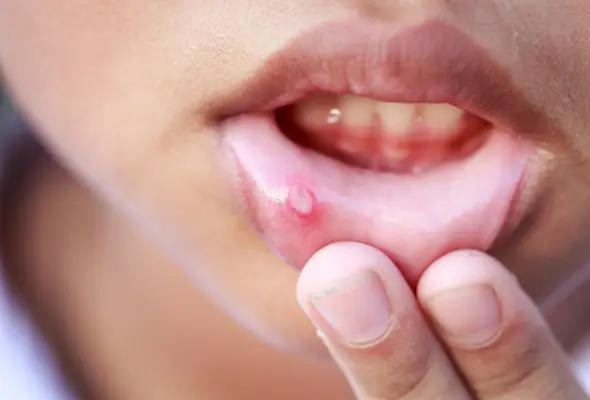-
Doctors
-
Specialities & Treatments
Centre of Excellence
Specialties
Treatments and Procedures
Hospitals & Directions HyderabadCARE Hospitals, Banjara Hills CARE Outpatient Centre, Banjara Hills CARE Hospitals, HITEC City CARE Hospitals, Nampally Gurunanak CARE Hospitals, Musheerabad CARE Hospitals Outpatient Centre, HITEC City CARE Hospitals, Malakpet
HyderabadCARE Hospitals, Banjara Hills CARE Outpatient Centre, Banjara Hills CARE Hospitals, HITEC City CARE Hospitals, Nampally Gurunanak CARE Hospitals, Musheerabad CARE Hospitals Outpatient Centre, HITEC City CARE Hospitals, Malakpet Raipur
Raipur
 Bhubaneswar
Bhubaneswar Visakhapatnam
Visakhapatnam
 Nagpur
Nagpur
 Indore
Indore
 Chh. Sambhajinagar
Chh. SambhajinagarClinics & Medical Centers
Book an AppointmentContact Us
Online Lab Reports
Book an Appointment
Consult Super-Specialist Doctors at CARE Hospitals

Canker Sores
Symptom, Causes, Diagnosis and Treatment
Canker Sores
Canker sores are a common and frustrating problem that affects many people. These small, painful ulcers can occur on the soft tissues inside the oral cavity, causing discomfort and making everyday activities like eating, drinking, and talking challenging. While they're not contagious, canker sores can significantly impact a person's quality of life.
This comprehensive blog will provide a detailed explanation of canker sore causes and effective canker sore treatments. We'll explore what triggers these pesky mouth ulcers, how to recognise their symptoms, and the best ways to manage them. From medical interventions to home remedies, we'll cover various approaches to cure canker sores in the mouth and provide tips to prevent future outbreaks.

What Are Canker Sores?
Canker sores, also called mouth ulcers or aphthous ulcers, are small, shallow ulcers that arise on the soft tissues inside the mouth. These painful sores typically appear on the insides of the cheeks or lips, on or under the tongue, at the base of the gums, or on the soft palate. Unlike cold sores, canker sores are non-contagious ailments and do not occur on the surface of the lips.
These mouth ulcers are usually round or oval in shape, with a white or yellow centre surrounded by a red border. They can vary in size, with most being under one-third of an inch (1 centimetre) across. Before canker sores appear, you may notice a burning or tingling sensation in the ulcer area.
The following are three main types of canker sores:
- Minor Canker Sores: These are the most common type. They're small, oval-shaped, and typically heal without scarring within one to two weeks.
- Major Canker Sores: Less common but larger and deeper than minor sores, these can be extremely painful & may take up to 6 weeks to heal, sometimes leaving scars.
- Herpetiform Canker Sores: These are rare and usually develop later in life. They appear as clusters of tiny ulcers, often merging into one large sore.
Causes and Risk Factors of Canker Sores
While the root cause of canker sores remains hidden, several factors can contribute to their development, such as:
- Dietary Factors: Certain foods may trigger or worsen canker sores. These include acidic fruits like citrus, strawberries, and tomatoes. Some may also experience canker sores after consuming chocolate, coffee, nuts, or spicy foods. Additionally, nutritional deficiencies, particularly in vitamin B-12, zinc, folic acid, or iron, may increase the likelihood of developing canker sores.
- Stress and Hormones: High levels of emotional stress or anxiety have an impact on canker sore development. Studies have presented a connection between stress levels and the occurrence of these mouth ulcers. Hormonal changes, especially during menstruation, can also trigger canker sores in women.
- Underlying Health Conditions: Several health conditions may have a connection to canker sores. These include inflammatory bowel diseases like Crohn's disease and ulcerative colitis, celiac disease, and Behçet's disease. Immunodeficiencies, such as those caused by HIV/AIDS, can also increase the possibility of developing canker sores.

Risk Factors
Certain factors may make some people more prone to canker sores. These include:
- Teenager or young adult
- Females
- Having a family history of canker sores
- Poor oral hygiene
- Use of dental appliances like braces
- Oral hygiene products containing sodium lauryl sulphate
Symptoms of Canker Sores
The symptoms of canker sores can vary in intensity and duration, but there are some common signs to look out for, such as:
- The first indication of a developing canker sore is often a burning or tingling sensation in the affected area. This sensation usually occurs 6 to 24 hours before the sore becomes visible.
- As the sore forms, it takes on a round or oval shape with a white, grey, or pale yellow centre surrounded by a red border.
- Canker sores can be painful, mainly when eating or drinking.
- Sometimes, a person may develop a single sore; in others, multiple sores may appear in clusters.
- In severe cases, canker sores may be accompanied by additional symptoms such as fever, fatigue, and swollen lymph nodes.
Diagnosis of Canker Sores
Canker sores are often easy to identify due to their distinctive appearance and symptoms.
- Visual Examination: The doctor will closely inspect the lining of the patient's mouth and ask about their symptoms and eating habits.
- Additional Tests: These tests may include:
- Swab Test: To detect bacterial or viral infections
- Blood Test: To identify any underlying nutritional deficiencies or health conditions
- Tissue Sample: To examine the affected area more closely
- Examination of Certain Organs: To check for related conditions like inflammatory bowel disease
Treatment For Canker Sores
Aphthous ulcers often heal on their own within a week or two. However, medical care may be necessary for larger, persistent, or excruciating sores. Several treatment options are available to ease discomfort and speed up healing, such as:
- Over-the-counter Medications:
- Topical anaesthetics containing benzocaine can numb the affected area and reduce pain.
- Mouth rinses with hydrogen peroxide, or chlorhexidine can help cleanse the sore and prevent infection.
- Protective gels or patches that create a barrier over the ulcer, shielding it from irritation.
- Prescription Medications:
- Prescription mouth rinses containing dexamethasone or lidocaine can help reduce pain and inflammation.
- Topical corticosteroids decrease immune response and promote ulcer healing.
- In some instances, doctors recommend oral medications such as sucralfate or colchicine.
- Nutritional Supplements: Doctors may prescribe Vitamin B-12, zinc, or folic acid supplements to address underlying nutritional issues contributing to canker sore development.
- Cauterisation: In severe canker sores, doctors may use a chemical substance or instrument to burn or destroy the affected tissue, reducing healing time and relieving pain.
When to See a Doctor
While canker sores often heal on their own, there are situations where medical attention is necessary, such as:
- If you have a canker sore that lasts longer than three weeks
- Located near the back of your throat
- If your canker sore bleeds or becomes more painful and red
- Unusually large sores
- Sores that spread
- Extreme pain despite avoiding trigger foods & taking over-the-counter pain medication
- Difficulty in consuming fluids
- High fever accompanying canker sores
- Frequent mouth sores
Home Remedies for Canker Sores
While canker sores often heal on their own, several home remedies can speed up the healing process and relieve discomfort, such as:
- Saltwater Mixture: Mix one teaspoon of table salt in half a cup of lukewarm water and swish it for 15 to 30 seconds before spitting it out. This can help dry out the sores and reduce inflammation.
- Aloe Vera Gel: The application of a thin layer of aloe vera gel on the canker sore can ease pain and promote faster healing.
- Honey: Applying a small amount of unpasteurised, unfiltered honey to the sore a few times daily may help reduce pain and speed healing.
- Coconut Oil: The application of coconut oil directly to the canker sore several times daily may help prevent infection and reduce discomfort.
- Yoghurt: Yoghurt containing live probiotic cultures may also be beneficial, especially if your canker sores are related to digestive issues.
Prevention
Preventing canker sores involves identifying and avoiding potential triggers, including:
- Watch what you eat to reduce the frequency of these painful mouth ulcers. Avoid food products that irritate your mouth, such as nuts, chips, pretzels, spicy foods, and acidic fruits like pineapple, grapefruit, oranges.
- Practising good dental hygiene is key to preventing canker sores. Regularly brush your teeth after meals and floss once daily. Consider switching to toothpaste and mouth rinses that don't contain sodium lauryl sulphate.
- Chewing your food slowly and avoiding talking while eating can also help prevent accidental injuries to the inside of your mouth.
- Stress can contribute to canker sores, so finding ways to manage stress is essential.
- Lastly, ensure your diet includes whole grains, fruits, and vegetables to prevent nutritional deficiencies. Foods rich in iron, folic acid, vitamin B12, and zinc can be particularly beneficial in warding off canker sores.
Conclusion
Canker sores are a common and often frustrating problem that many people deal with. From simple home remedies like saltwater rinses to medical interventions for severe cases, many ways exist to manage and decrease the discomfort caused by canker sores.
Prevention plays a crucial role in managing canker sores. By identifying and avoiding triggers, maintaining good oral hygiene, and managing stress, you can reduce the frequency of these bothersome mouth ulcers. Remember, while most canker sores heal on their own, a doctor should check persistent or severe cases to rule out any underlying health issues.
FAQs
1. Who gets canker sores?
Canker sores can affect anyone, but they are more common in certain groups. Teenagers and adolescents are especially prone to developing these painful mouth ulcers. Due to hormonal fluctuations, women are more likely to experience canker sores than men. Additionally, individuals with a family history of aphthous ulcers are more susceptible to developing them.
2. How to make canker sores go away?
While aphthous ulcers typically heal on their own within one to two weeks, there are several ways to speed up the healing process and alleviate discomfort. Over-the-counter treatments, such as topical anaesthetics containing benzocaine, can numb the ulcer area and reduce pain. Mouth rinses with hydrogen peroxide, or chlorhexidine can cleanse the sore and prevent infection. A doctor may prescribe corticosteroid ointments or mouth rinses for severe cases to reduce inflammation and promote healing.
3. What is best to eat with canker sores?
Choosing soft, bland foods that won't irritate the affected area is best when dealing with canker sores. Opt for foods like yoghurt, cottage cheese, mashed potatoes, and soft-cooked vegetables. Soups and stews with tender meats are good options, as are breakfast foods like instant oatmeal and cold cereal softened in milk. It's advisable to avoid acidic, spicy, or salty foods that can exacerbate the pain and irritation caused by canker sores.
Still Have a Question?




